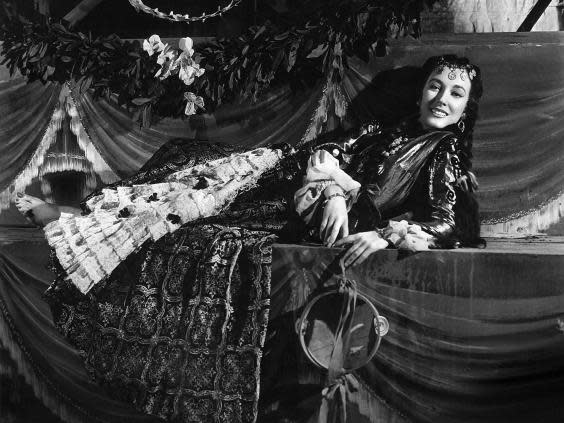Valentina Cortese: Beguiling and flamboyant Italian actor who lit up Truffaut’s ‘Day for Night’
When Ingrid Bergman accepted an Oscar for Best Supporting Actress in 1975 for her cameo role in Murder on the Orient Express, she stood before millions of television viewers and insisted that fellow nominee Valentina Cortese was more deserving of the prize.
Bergman later conceded the impolitic nature of her remark, given the presence of the other losing actors – Madeline Kahn, Diane Ladd and Talia Shire. But she said she felt compelled to highlight Cortese’s bravura and heavily improvised portrayal of an ageing, alcoholic movie star in Day for Night, the Oscar-winning French-language romantic comedy by writer-director Francois Truffaut.
“She gave the most beautiful performance,” Bergman declared of Cortese at the Academy Awards ceremony. “Please forgive me, Valentina.”
Cortese’s humane portrait, equal parts comic and disturbing, captured a prima donna past her prime and on the verge of a breakdown. Her character blows her lines, opens the wrong doors and weeps in the arms of a clearly uncomfortable younger lover. “As soon as we grasp things,” says the champagne-tippling Severine, unmoored by her faulty memory, “they’re gone.”
Cortese, who has died aged 96, appeared in more than 100 movies and TV shows under directors as varied as Robert Wise, Jules Dassin, Terry Gilliam and Federico Fellini. With her headscarves and unguardedly discursive style – she peppered her conversations with the endearment “darling” – Cortese cut a flamboyant profile in Hollywood, if only briefly, and in the filmmaking capitals of Europe for more than five decades. Her performances combined wily intelligence and earthy sensuality, and she was esteemed among her peers and by some critics. But she never attained top stardom, a reflection of her self-described “nonconformist” attitude towards the star-making machinery.
Cortese entered films in 1941 playing ingenues before portraying two female lead characters, Fantine and Cosette (mother and daughter), in a 1948 Italian adaptation of the Victor Hugo novel Les Misérables. She came to the UK the following year to make a romantic melodrama, The Glass Mountain, a hit that captured the attention of Darryl F Zanuck, chief of Twentieth Century Fox studios. He signed her to a contract, changed the spelling of her name to Cortesa and showcased her in a series of dramas, placing her in the vanguard of Italian actresses lured to Hollywood after the Second World War, among them Anna Magnani, Gina Lollobrigida and Sophia Loren.
Perhaps Cortese’s finest early turn was in Dassin’s well-regarded film noir Thieves’ Highway (1949), in which she played a streetwalker who helps a handsome young truck driver (Richard Conte) take down a corrupt San Francisco produce dealer (Lee J Cobb). On loan to Metro-Goldwyn-Mayer studios, she portrayed an Italian torch singer in Malaya (1949), a Second World War film with James Stewart and Spencer Tracy that bombed at the box office.
She soon returned to Italy, where her actor husband Richard Basehart starred in Fellini’s 1954 masterpiece, La Strada, and Cortese had a supporting role the same year in The Barefoot Contessa, director Joseph L Mankiewicz’s shaggy-dog satire of the film business starring Humphrey Bogart and Ava Gardner.

Cortese went on to a long and periodically distinguished career in European cinema, including Michelangelo Antonioni’s Le Amiche (1955) as a ceramic artist with a masochistic devotion to her philandering husband, Fellini’s surrealistic Juliet of the Spirits (1965) and Franco Zeffirelli’s TV miniseries Jesus of Nazareth (1977) as the princess Herodias.
The centrepiece of her later career was Day for Night, but she was also was a stalwart of Milan’s Piccolo Teatro, working frequently under Zeffirelli and Giorgio Strehler.
Valentina Cortese was born in Milan to an unmarried concert pianist in 1923 and raised by foster parents in rural Lombardy. She began performing at 15 at open-air village festivals on the banks of Lake Maggiore and was spotted by theatre critics from Milan newspapers who encouraged her to take the entrance exam for the national academy of dramatic arts in Rome. One of the examiners was a prominent Italian film director who signed her on the spot. She said she became so busy in movies that she never had time to study at the academy.
Off-screen, she began a long-term affair with Victor de Sabata, a married Italian conductor and composer three decades her senior. She left for Hollywood in large part to break off their intense relationship.
Her films included Secret People (1952), a political thriller featuring a young Audrey Hepburn, and Love and Troubles (1958), an Italian comedy with Basehart and Marcello Mastroianni. In director Joseph Losey’s The Assassination of Trotsky (1972), she won admiring reviews in the small role of the wife of exiled Russian Revolution leader Leon Trotsky (played by Richard Burton). She was the lunar queen in Gilliam’s The Adventures of Baron Munchausen (1988).

Francesco Patierno used eight actors to portray dimensions of her life in Diva!, a 2017 documentary based on her memoir Quanti Sono I Domani Passati (“How many tomorrows past”).
“People go to the movies to see beautiful young girls, but an older woman who has worked a long time has achieved something a young actress hasn’t,” she said in 1974. “I don’t have ambitions. I just love what I do. How could I have become like Sophia Loren, where Ponti builds her and she says, ‘Yes, yes, yes.’ I’m free to make my own mistakes. And at least I am myself.”
Her son Jackie, an actor, died in 2015, and she was predeceased by her second husband, the pharmaceuticals magnate Carlo de Angeli.
Valentina Cortese, actor, born 1 January 1923, died 10 July 2019
© Washington Post

 Yahoo News
Yahoo News 
